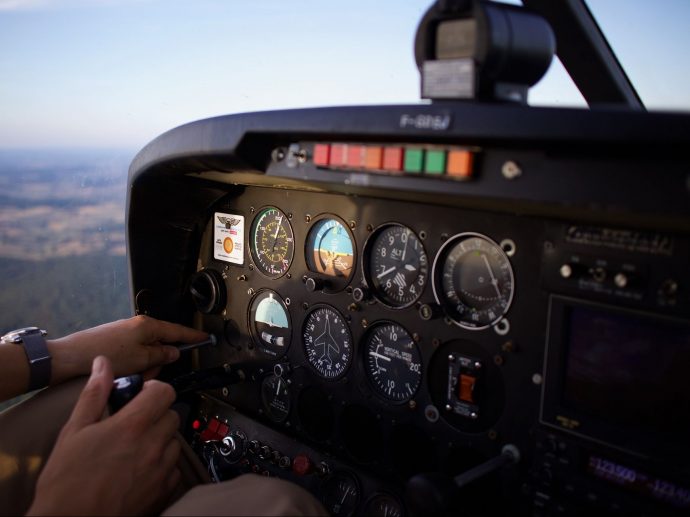Categories more
- Adventures (16)
- Arts / Collectables (15)
- Automotive (37)
- Aviation (11)
- Bath, Body, & Health (76)
- Children (6)
- Cigars / Spirits (32)
- Cuisine (16)
- Design/Architecture (21)
- Electronics (12)
- Entertainment (4)
- Event Planning (5)
- Fashion (44)
- Finance (9)
- Gifts / Misc (6)
- Home Decor (44)
- Jewelry (40)
- Pets (3)
- Philanthropy (1)
- Real Estate (14)
- Services (22)
- Sports / Golf (14)
- Vacation / Travel (60)
- Watches / Pens (14)
- Wines / Vines (24)
- Yachting / Boating (16)
Choosing the Right Pilot School Training Program for Aspiring Aviators
Published
12/11/2024For aspiring pilots, choosing the right flight school is an important step toward a successful aviation career. With many options available, it can be overwhelming to decide which path to take. Understanding these choices is key, as each program focuses on different skills and knowledge that will shape your aviation career. As the need for qualified pilots grows, making an informed decision is vital for anyone ready to fly.
The first step is to consider your goals, whether that’s flying for fun, advancing in a professional career, or teaching others. Most pilot school services offer a range of training programs, from the Private Pilot License to advanced courses like Instrument Ratings and Certified Flight Instructor training. Each program provides different opportunities and helps pave the way for a rewarding career in aviation.
Private Pilot License Training: Your First Step to the Skies
Getting a Private Pilot License (PPL) is a key milestone in anyone's aviation experience. This training introduces the basic skills needed for personal flying. Students learn to operate different types of aircraft and improve their piloting skills to move through airspace efficiently. The course also covers communication with air traffic control and other pilots.
The program includes hands-on flight training, helping students build confidence in their flying skills. With each solo flight, students gain the experience needed to safely fly with passengers. The excitement of personal flying offers a freedom that's missing from commercial air travel, bringing a new sense of adventure.
Instrument Rating Course: Mastering the Skies in Any Weather
Moving from a PPL to an Instrument Rating Course is a significant step in a pilot's development. This course focuses on flying under Instrument Flight Rules (IFR), which allows pilots to fly in conditions where visibility is poor or nonexistent. The training helps pilots become skilled at using flight instruments, which are important when flying through clouds, fog, or heavy rain.
As students practice flying only by instruments, they gain the confidence needed for more complex situations. They become proficient in procedures like instrument approaches and holding patterns through consistent practice and simulations. This training not only boosts safety but also expands the range of flights pilots can undertake, allowing them to explore new areas and different flying conditions.
Commercial Pilot License Training: Taking Your Skills to New Heights
Many aspiring pilots aim to pursue a professional career in aviation by earning a Commercial Pilot License (CPL). This training teaches advanced flight techniques and maneuvers necessary for safely transporting passengers and cargo. The program covers important areas of commercial aviation, such as performance calculations, emergency procedures, and navigation planning. Skilled instructors help students learn how to operate various aircraft in different situations.
The training also focuses on developing strategic thinking. Students learn to assess and reduce risks while staying aware of their surroundings during flights. A deep understanding of regulations and best practices prepares them for roles like airline pilot, cargo pilot, or charter operator. Graduates leave with a strong skill set and the confidence to handle the challenges of the changing aviation industry.
Certified Flight Instructor Course: Teaching the Next Generation
The Certified Flight Instructor (CFI) Course is designed for experienced pilots who want to teach and share their passion for aviation. The program focuses on key teaching methods, preparing participants to train future pilots. It covers safety principles and effective instruction techniques to help candidates build a strong foundation in flight education.
Aspiring CFIs will learn to assess student performance and create lesson plans that fit different learning styles. This training fosters a positive learning environment where students can understand flying concepts and develop practical skills. Clear communication is emphasized throughout, as it is essential for giving instructions and feedback. Those graduating from the CFI Course not only improve their own aviation knowledge but also play a vital role in training the next generation of pilots.
Ground School: Laying the Foundation for Flight Knowledge
Ground School is the foundation of pilot training, providing the essential theoretical knowledge needed in aviation. Key subjects include aerodynamics, which explains how aircraft fly, and meteorology, which helps pilots understand weather conditions. Learning navigation principles supports route planning, while knowing aviation regulations promotes safety and compliance.
Ground School can be taken in-person or online, offering flexibility for students to fit learning into their schedules. This course prepares students for flying, helping them gain a strong understanding of the concepts that guide successful piloting. Learning about real-world flying situations boosts both confidence and competence, which are key for becoming skilled pilots.
Deciding on a pilot training program depends on your personal goals. Each option offers different skills and experiences that shape your future in aviation. Understanding the details of each program, from the Private Pilot License to Certified Flight Instructor, helps you make choices that match your aviation dreams. These decisions guide you toward rewarding experiences in the skies, whether for personal growth or career advancement. Choosing the right program is the first step toward a successful career as an aviator, leading to a life of freedom in flight.















